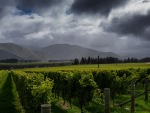In the past few years a number of large properties have been leased by the likes of Constellation, Delegat’s and Indevin, with wholescale vineyard development being undertaken.
Lawyer Peter Radich says it was not something people considered in the region a few years back, but as restrictions on overseas investment grow, and land values rise, it has suddenly become a viable option.
“There were some leases undertaken quite a number of years ago when Montana (as they were) decided to lease some Rapaura properties and those leases have carried on. Then leasing went out of fashion with the wine companies. I think that was because the rentals that were having to be paid, were disproportionate to the returns the wine companies were getting back.”
Now they are back in favour, with two styles being considered by landowners and wine companies. One, is leasing an already developed vineyard. The other is for a wine company to lease bare land. Radich says this is the more popular of the two options.
“The wine company then puts all of the grapes and support structures in place, the irrigation and where appropriate, wind machines as well,” Radich says. “Then it takes the crop. Under those typical arrangements, the wine company will be paying the landowner a value of 7 to 7.5 percent and in some infrequent cases 8 percent of the capital value of the land, before improvement.”
He says typically, these leases have rent review arrangements every five years.
“So the rental will start off at say 7% of $1 million and then five years later that will be reviewed. What is reviewed is not the percentage because that is set, it is the capital value of the land alone. So if the land (without improvements) is valued at $1.5 million after five years, then the landowner gets a return of 7% of that.”
Radich describes the arrangement as “an attractive one” from the point of view of a landowner who doesn’t want to be actively involved in viticulture themselves, but is looking for a secure investment that ensures they do not lose their land forever.
“We have got people who say, ‘we are now in our 60’s and we don’t want the hassle of developing a vineyard – but we have owned the land for donkeys years and we don’t want to sell it. We want to hand something on to our children’. Yes they won’t be able to get access to it for 30 years or more, but they will have a nice income from it.”
Some good reasons for landowners, but why are wine companies so keen to lease land?
“Security of supply, and I think it is probably evident to wine companies that they can produce their own grapes, even if they are leasing land, at a more favourable price than by paying contract growers to do so.”
For wine companies owned off-shore, the ability to increase supply without having to go through the Overseas Investment Office (OIO) is another reason why leasing has become more popular in recent years, Radich says. As the OIO tightens its rules on who can buy New Zealand land, more off shore companies are looking for alternatives. Given there are also certain restrictions relating to off shore companies leasing land, Radich says one at least, is using a profit-á prendre arrangement. This is defined as the ‘right of taking the produce or part of the soil from the land of another person’, and is allowed under OIO rules.
While Radich couldn’t say exactly how much Marlborough land is currently being leased, he described it as “an awful lot”.
So what are the issues – what should a landowner consider before going into a lease agreement?
“First thing is the certainty of arrangements,” Radich says. “In other words, how long is a lease for? Does the wine company want a right of renewal and if so, how long would that be for? When are the rent reviews due? How are the rent reviews dealt with? Who is responsible for the outgoings, rates and everything else? Is the rate of return sufficient and is it a fair rate of return on your capital value?”
He also says the landowner needs to be happy with the way the land is going to be farmed – and the effect that form of farming will have on the long term value of the land.
“There are also issues if you are remaining living on the land. To what extent will the activities of the vineyard development affect you in your home? The presence of wind machines is one of those sort of issues.”
Another critical issue is who controls the water rights. Given Marlborough like so many other places in New Zealand has an over allocation of water, (even if not all that water is being used), there are risks that if the wine company does not adhere to the rights, they can be withdrawn.
“Water rights are an asset of huge value. You have to be sure that you ultimately have control of your water right when you get your land back. No more rights are being given out, so once it is lost, you are unlikely to regain it.”
Another consideration to take into account, especially given the events of November last year, is what happens if a natural disaster strikes – such as an earthquake?
“This is important and it has got to be addressed. The usual situation is, if the land you are leasing is wrecked, then you can’t expect a return on that. If the land is destroyed, ordinarily the obligation of the lessee to continue paying rent would stop. And in situations for example, where you are near to a river and the river may take away some of the land, the issue becomes one of some importance.”
While weather events that affect crop will be the lessee’s responsibility, anything that impacts on the land remains the landowners.
Radich also advices taking legal advice if you are considering such a contract – given every individual lease has its own idiosyncrasies.
“Every lease is different, with its own set of issues. All of those issues need to be carefully worked through.”
As for the future, he doesn’t see the current trend abating in a hurry.
Especially as the growth of Marlborough Sauvignon Blanc continues to grow and wine companies struggle to keep up with demand.












